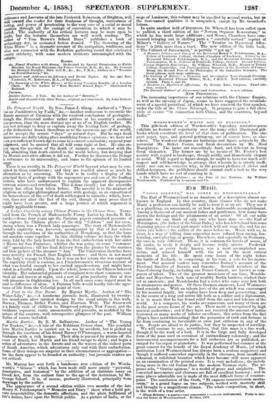Vtni MUHL
"MIS SA SOLENNE," DAL CONTE DI WEST MO REL AND.*
The Earl of Westmoreland is an Amateur, of a description almost un- known in England. In this country, those classes who do not make
Music a profession can hardly be said to treat it as an art. They use it as a plaything, an amusement, or at best a fashionable accomplishment. Among a thousand of our musical ladies and gentlemen, how many have shown the feelings and the attainments of an artist ? Of all our noble amateurs we can think of only two who have done so—the Earl of
Mornington, (the father of the Great Duke,) who has left behind him some charming pieces of vocal part-music which will not soon die, and his re-
lative (we believe) the author of the mass before us. Music with us, in short, is a way of killing time somewhat more refined than racing, fox- hunting, card-playing, or gossip. Elsewhere, and especially in Germany, the case is very different. There, it is common for lovers of music, of all ranks, to study it deeply and become really artists. Frederick the Great, as every body knows, was a most accomplished mu- sician, and solaced himself with the art in the most critical moments of his life. He spent some hours of the night before the battle of Rosbach, in composing, in his tent, a solo for his instru- ment. Our musical readers may remember Burners account of the Electoral families of Bavaria and Saxony. Several members of the Saxe-Cobourg family, including our Prince Consort, are known as com- posers of talent. Two of the greatest musicians of our time, Mende's- sohn and Meyerbeer, both sons of wealthy Berlin bankers, studied their art as amateurs; and Mendelssohn had a sister who came near him both in attainments and genius. Of these German amateurs, Lord Westmore- land reminds us. With an inborn love of the art which was encouraged by his musical family, his studies have been deep and persevering; and in the course of a long and active life both as a soldier and a diplomatist, it is in music that he has found relief from the cares and labours of the world. As a composer, his works are numerous, and many of them are in the most severe forms of the art. Their merit is recognized by high musical authorities ; and if they have not received the amount of notice bestowed on many works of inferior excellence, this arises from the fact (Pope's lines notwithstanding) that the possession of rank and fortune is far from conducing to favourable or even just criticism in any of the arts. People are afraid to do justice, lest they be suspected of servility. We will venture to say, nevertheless, that this mass is a fine work though it be the work of a lord. It is in the large and fully developed form of the mass used on occasions of extraordinary solemnity; and the instrumental accompaniments for a full orchestra are as published, ar- ranged for the organ or pianoforte. It was performed last summer at the great concert for the benefit of the Royal Academy of Music, (of which institution Lord Westmoreland has always been a zealous supporter) and though it suffered somewhat especially in the choruses, from insufficient rehearsal, it exhibited beauties which have become still more apparent on an examination of the printed score. It is very melodious; the melody being more in the old Italian than the modern German style. The so- prano solo, " Gratias agimus," is a model of grace and simplicity. The concerted movements and choruses are full of excellent harmony; and in some places admirable use is made of the most difficult forms of counter- point. The conclusion of the Credo, "Et expecte resurrectionem aorta-
°ram," is a grand fugue on two subjects, worked with masterly elan and brought to a magnificent climax. The whole composition, in short, is the work of a true artist.
• Missal defense; a quattrovoci eoncertate e core con instramenti. Poets in mu- sics dal Conte di Westmoreland. Berlino, 1858.


































 Previous page
Previous page